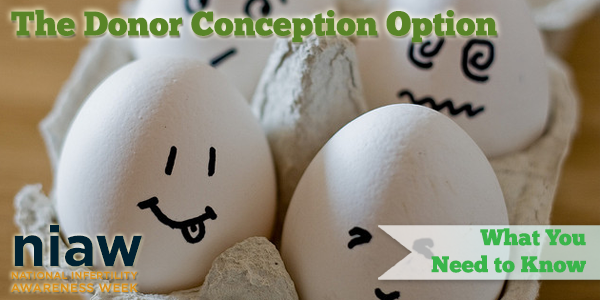Our National Infertility Awareness Week blog continues! Every day this week, we’ll feature one of our Circle of Support Sponsors as they share helpful information and advice about infertility, your options and coping. Today’s post is brought to us by Bronze Sponsor Cardone Reproductive Medicine and Infertility.
By Rita Sneeringer, MD
The option of donor egg or donor sperm treatment may be offered to provide significant improvement in the odds of achieving a pregnancy. These treatments involve several important steps. The following summary is meant to provide an overview of this process.
When is donor egg or donor sperm treatment indicated?
There are several potential indications. Donor eggs may be used when a low egg supply is associated with a low chance of pregnancy using one’s own eggs. For example, women who have not been successful with multiple prior IVF cycles, who have a poor ovarian reserve testing, or who have been diagnosed with premature ovarian insufficiency (premature menopause) are good candidates for donor egg treatment. Similarly, donor sperm might be indicated for a man who has severely impaired or absent sperm production. Genetic considerations are also important. In situations in which either partner has a genetic mutation, having an egg donor or sperm donor would help prevent inheritance of a genetic disease in their children. Finally, single or same-sex couples use donors.
How do I choose a donor?
One of the first decisions is choosing between an anonymous or known donor. Anonymous donors have had initial screening by agencies and have profiles available to review. A donor can be selected based on personal information (ethnicity, appearance, education), medical history, and/or family medical history. Sperm donors have usually also been screened for infectious diseases (required by the FDA) and sometimes have had ethnicity based genetic mutation carrier screening (eg. cystic fibrosis). Egg donors, by contrast, may or may not have been pre-screened for infectious diseases and predicted response to the egg retrieval cycle. This depends primarily on whether fresh or frozen donor eggs are selected. With frozen donor eggs, the screening is generally already completed. With fresh donor eggs, the screening usually is done after matching with a donor.
Some people prefer to have a donor that is known to them. Most clinics require similar screening of known donors which includes considerations for age, medical history, family medical history, psychological screening, and FDA-required infectious disease screening.
What is the timeline for treatment?
The timeline depends on the specific type of treatment elected. For anonymous frozen donor sperm or donor egg cycles (pre-screened) there is generally little delay in starting treatment. However, for an anonymous fresh donor egg or known donor cycle, screening can take several months to coordinate testing and consultations for medical screening, psychological screening and legal contracts. In addition, it is possible that the first donor selected may not be a suitable donor and a second donor would need to be selected and screened. Thus, the timeline is highly variable, but can take 4-6 months.
What are the associated costs?
Total cost depends on the specific treatments chosen and possible insurance coverage (partial or complete). Potential costs include the following: procedure fees for IVF or IUI treatments, recipient screening fees, agency fees for donors, donor screening fees including FDA required testing, medical consultation fees, psychological screening consultation, and legal consultation. As there are many variables, I recommend meeting with your clinic to discuss the specific estimated costs of your individual treatment.
Will it work?
The likelihood of treatment with donor egg or donor sperm leading to a live birth depends on the type of treatment and patient characteristics. For donor egg treatment, success rates are estimated at approximately 50% per cycle. For donor sperm, success rates for insemination approach natural fertility at up to 20% per cycle and for IVF are dependent on the woman’s age. It is important to note that donor egg and donor sperm do offer highly effective options, but do not guarantee pregnancy.
As you are considering your options, a supportive and informative environment is essential to help you make the decision that is right for you. I hope that this brief overview was helpful to get started. More information is available from clinics that provide donor treatments.
About the Author
Dr. Rita Sneeringer is a board certified Reproductive Endocrinologist at Boston IVF and Cardone Reproductive Medicine. Dr. Sneeringer’s clinical interests include infertility, polycystic ovarian syndrome, amenorrhea, premature ovarian failure and hyperprolactinemia. Dr. Sneeringer also has an interest in the medical and surgical treatment of fibroids and endometriosis. She performs minimally invasive surgery (laparoscopy and hysteroscopy) for the purpose of optimizing fertility.
Cardone Reproductive Medicine and Infertility, LLC, (CRMI) provides the best of both worlds: cutting edge technology in reproductive sciences offered in a caring atmosphere where each client is treated in a compassionate manner. Medical Director Dr. Vito R.S. Cardone has 20 years of experience providing all types of advanced treatment for individuals faced with fertility challenges.
Still have questions about pursuing the donor conception option? Register for RNE’s Donor Conception Connect & Learn full-day seminar on May 4th! Financial assistance is still available to attend.


